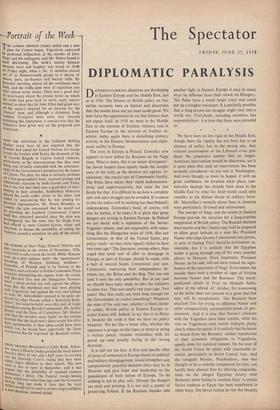--Portrait of the Week
THE LONDON OMNIBUS STRIKE ended and a new Plan for Cyprus began. Yugoslavia expressed its profound indignation at the murder of Imre Nagy and his colleagues, and Mr. Nehru found it Most distressing. The week's uneasy balance between tears and laughter was struck at 10.48 on Friday night, when a No. 11 omnibus moved out of its Hammersmith garage to a chorus of cheers, jeers, car-hooters and bicycle bells. By Saturday morning, almost all the omnibuses were back, and the traffic-jams were of regulation size after almost seven weeks. There was a good deal of uncertainty about the precise terms on which the staffs had gone back to work; early reports seemed to show that Sir John Elliot had given way ,on the union's demand for an increase for the country' men, and although a statement from London Transport went some way towards correcting this impression, it remains true that the Executive have given way on the proposed cuts in services.
WITH THE SITUATION in the Lebanon looking blacker every hour (it was reported that the Premier had asked the United Nations for troops to seal the frontier with Syria), the despatch of the lst Guards Brigade to Cyprus looked ominous, Particularly as the announcement that they were being sent virtually coincided with the announce- ment of the Government's intentions for the future of Cyprus. The plan, for what is virtually partition On a non-geographical basis, received prompt and enthusiastic rejection by both Greeks and Turks, but it was felt that there was a good deal of face- making in their attitudes. Archbishop Makarios played his cards rather closer to his chest, and ended by announcing that he was sending his personal representative, Mr. Zenon Rossides, to London (he also announced that he would not he attending the Lambeth Conference). Cyprus itself has remained peaceful since the plan was promulgated, but the news that vas Hugh Foot had offered to meet Colonel Gr, alone and unarmed, to disouss the possibility of ending the Violence, caused a sensation on and off the island.
* THE MURDER OF Imre Nagy, General Maleter and their associates in the events of November, 1956, continued to echo round the world. While Moscow t ,o2k LIP a new outdoor sport—the 'spontaneous' ,-7ashir18 of Western Embassy windows— of Poland, said to be furious at the ,murders, sent a circular to Polish Communist Party branches dissociating his regime from the crime, and Marshal Tito sent the Hungarian 'Govern- ment'a sharp protest not only against the allega- tTl ions that the murdered men had been plotting With Yugoslavia, but against the trial and killings as such. Mr. Khrushchev seemed to be quite un- moved by what Pravda called a 'hysterical hulla- baloo less imperturbable were that pair of tragic comedians among British Communists, Mr. Arthur Horner and the Dean of Canterbury. Mr. Horner said that the murders were 'futile' on the curious ,grounds that the dead men's ideas would live after ,.`n,eni (presumably if their ideas could have been "led, too, he would have approved); the Dean announced that he 'regretted' the Russians' action. FRESH TROUBLE threatened at Little Rock, Arkan- sas, where a District Judge granted the local school board a delay of two and a half years in carrying out the Supreme Court's ruling that they must admit negro children to their school. The new i
term is due to open in September, and it was
dargued that the possibility of renewed violence m been withdrawn some time ago, and the Governor having long ago made it clear that the local militia would not be used to protect negro children, a new deadlock loomed ahead.


































 Previous page
Previous page